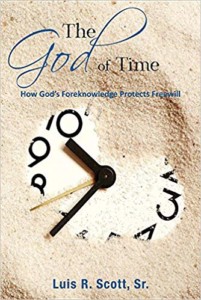 Title: The God of Time: How God’s Foreknowledge Protects Freewill
Title: The God of Time: How God’s Foreknowledge Protects Freewill
Author: Luis R Scott Sr.
Publisher: Toplink Publishing, LLC
ISBN: 1948962780
Genre: Religion & Spirituality
Pages: 212
Reviewed by: Liz Konkel
Pacific Book Review
The God of Time: How God’s Foreknowledge Protects Freewill aims to challenge open theism with a detailed exploration of freewill and God’s ability to know the future. Open theism suggests the future doesn’t exist therefore God can’t know the future, or if God knows the future, than that would imply there is no freewill. Author Luis R. Scott Sr. argues against this idea, exploring God’s role in both freewill and foreknowledge and goes into the idea of where evil comes from. Scott states freewill is a gift from God that gives people the freedom to choose good or evil and allows for an understanding of the difference between the two.
Scott opens The God of Time with a history and background of open theism to set up his debate with a concise understanding of what open theism is and how it does (and doesn’t work) as a theological system. Scott use of thorough examples to form a conclusion which finds inconsistencies with open theism and with evidence explains how God’s foresight and freewill go hand in hand. The scholarly style has an intellectual and personal standpoint as Scott backs up his argument with Bible verses and examples from open theists. The God of Time is written in a thorough manner with an easy to understand argument. Scott breaks down the information into four chapters with subsections that delve into subjects such as the ethical dilemma fallacy, liberation freewill, and Biblical prophecy. Every hypothesis pulls together as a clear and succinct argument.
Four key elements are addressed that Scott suggests open theism as a theological system should answer: prophecy is defined clearly; how God answers prayers that in turn have consequences for him; God’s knowledge of the present versus freewill; and how information becomes causative. Each of these is delved into as each component of open theism is clearly explained while also being challenged by Scott with another way of thinking. It is clear the author knows the subject thoroughly and has a passion for it. It’s also clear throughout that The God of Time isn’t meant to tear down the system, but provide alternate ways of thinking about freewill and God.
By explaining that God isn’t limited by time and only humans are limited by time, the debate is made against open theism that suggests if people have freewill then God can’t possibly know the future. To better understand God’s role with freewill, Scott explores what exactly freewill is by comparing God gifting the freewill to determine between good and evil with liberation freewill in open theism which means people’s choices “are free from the determination or constraints of human nature and free from any determination by God.” However, Scott states that though God knows all, it’s not coercive, meaning, “People retain the freedom to make their moral choices regardless of God’s knowledge.” The God of Time is a thought-provoking read with an intelligent argument that opens up the mind to explore the way individuals think about God, freewill, and time. You will find Scott’sbook to be a refreshing breath of fresh air as he establishes a sound case for God’s sovereignty.

